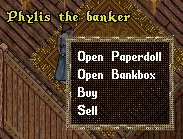Difference between revisions of "New Player Guide: Basics"
m |
m (tbc) |
||
| Line 76: | Line 76: | ||
|} | |} | ||
| + | |||
| + | <!-- Combat --> | ||
| + | {| cellpadding="10" style="border: 1px solid darkgray;" | ||
| + | | width="120px" | | ||
| + | ===Combat=== | ||
| + | [[File:Guide tab.png]]{{Line Break}} | ||
| + | [[File:Guide double click.png]] | ||
| + | | | ||
| + | You can toggle between War and Peace modes by pressing the Tab key. | ||
| + | |- | ||
| + | | colspan="2" | | ||
| + | <gallery widths="66px" heights="63px" perrow=2> | ||
| + | File:Guide CC peace button.jpg | ||
| + | File:Guide EC peace button.jpg | ||
| + | File:Guide CC war button.jpg|[[Classic Client]] | ||
| + | File:Guide EC war button.jpg|[[Enhanced Client]] | ||
| + | </gallery> | ||
| + | |} | ||
{| width=100% | {| width=100% | ||
Revision as of 14:45, 23 February 2012
Basics
Now that you are more familiar with the interface, it is time to take a walk and get to know the town around you. Depending on your starting location, you are now inside the local Inn or the city Bank .
Inns & Banks |
Inns act as lodging places for travelers who seek shelter to rest safely. They are safe places where you can log out instantaneously. Banks provide a place of storage, also known as the |
Context Menu & NPCs |
The term Context Menu refers to a menu accessed by single clicking on something (or holding down shift, then single clicking on something, if one has selected the option to handle it that way). Several game mechanics can be accessed this way. A Non-Player Character (NPC) is any character that is not controlled by a player. The term's polar opposite is Player Character. Although not controlled by players, monsters and animals are not generally considered NPCs. Hostile NPCs are sometimes categorized with other creatures or monsters. Typical examples of NPCs include: Bankers, Minters, Healers, Vendors and Guards. You can also pay NPCs for training your Skills up to a certain level. |
|
| |
Skills |
Ultima Online has 58 different skills currently in game which determine the capabilities of your Character. You can expend up to 700 points between these however you desire. In order to improve in a skill you simply carry out the associated actions. For example, if you wish to train as a Swordsman, simply fight Monsters with a sword equipped. Likewise, casting a Fishing Pole out into the water is all it takes to become a better Fisherman. Each skill is associated with certain Statistics, which are trained in the same manner. You can usually pay NPCs for training up to a certain level. For example, visit your local blacksmith's shop and you should be able to learn some of their trade via their Context Menus. You will be expected to pay for these services, of course, though the Gold requested is a pittance. The gold amount is 1 GP per 1/10 of skill with the highest amount of skill costing 400 gold for 40 skill points. |
| |
Statistics |
Stats, an abbreviation of statistics, refers to the three statistics all characters have in varying amounts, as follows:
|
| |
Combat |
You can toggle between War and Peace modes by pressing the Tab key. |
|
| |
Previous: Introduction to the Interface |
Next: Hints and Tips |










